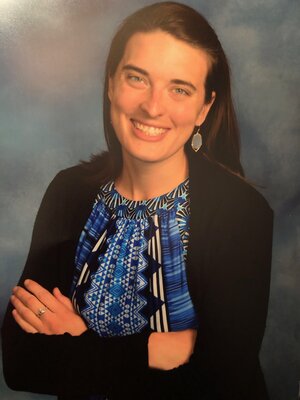Take me to the vocational discernment course!
by Annie Harton, MA, LMFTA
Most faithful Catholics can see how the world defines “love” is a shadow at best and a far cry at worst from the true love of God. Original sin, our own sin, and the sin of those around us pollutes the love that God intends for each of us.
By taking what we know by faith from Scripture and Church teachings as well as what we have learned from psychological studies, we can begin untangling the love of God from our fallen natures.
Understand the Source of Love
The largest crowdfunded TV show, “The Chosen”, orchestrates a creative license to help us visualize the stories of the first people who followed Jesus. One of these disciples is Simon Peter. There are two verses nearly hidden in the synoptic Gospels about Jesus healing Peter’s mother-in-law. Since Peter had in-laws, it can be deduced that he was married. It is curious what that would mean for him to leave home and follow Christ with reckless abandon.
The show suggests that both Simon and his wife “Eden” were intimately seen and known by God. When Simon was called by Jesus, Eden’s joy was greater than her sorrow. She did not grasp for what belonged to God. Instead of thinking that Jesus was taking away her spouse, she understood that Christ was answering her prayer for salvation. She wholeheartedly offered the love of her life back into the arms of the lover of their souls.
“God who created man out of love also calls him to love the fundamental and innate vocation of every human being. For man is created in the image and likeness of God who is himself love. (CCC 1604)
If Carl Rogers, one of the founders of humanistic psychology, were to sit down with a couple like Simon and Eden, he would likely highlight their “self-concept.” Merriam-Webster defines self-concept as the mental image one has of oneself. Rogers identifies self-image, self-esteem, and the ideal self as the three components of a person’s self-concept. This is the way we see ourselves, the value we place upon ourselves, and the self we would like to be, respectively.
Our Creator wants to permeate our self-concept with truth, rather than the lies that come from the world. As devout Jews, Simon and Eden kept their eyes on God as they awaited the coming of the Messiah. Honoring the Sabbath each week with a Shabbat meal with loved ones and spending time in the synagogue reminded them of who they were in God’s eyes. Their love for one another was not the end, but pointed to the end, the Omega. Letting God, rather than the world, tell them who they were allowed them to love freely.
Whether or not you are married, you can love freely as you accept that your relationship status does not define you or your value. Even if we are single and wanting to be married, we can be assured that where we are is where we are meant to be today. God takes care of our tomorrows as He takes care of today.
Since God created him man and woman, their mutual love becomes an image of the absolute and unfailing love with which God loves man. It is good, very good, in the Creator’s eyes.” (CCC 1604)
Respond to Your Vocational Call With Love
God calls each person to a unique vocational path of sanctification. Marriage is not a right; it’s a vocation. Some may not be called to it until later in life and some may not be called to it at all.
“Sacred Scripture begins with the creation of man and woman in the image and likeness of God and concludes with a vision of “the wedding-feast of the Lamb.” Scripture speaks throughout of marriage and its “mystery,” its institution and the meaning God has given it, its origin and its end…” (CCC 1602)
God works in mysterious ways. No matter what season one is in, God provides exactly what is needed for His perfect will. If we have a calling to the priesthood or religious life, we are called in a special way to a divine marriage. If we are married, we are given the grace to be a faithful partner in sickness and in health. If we are single, we are given the grace to be a faithful disciple trusting the God’s timing is always best.
“God himself is the author of marriage. The vocation to marriage is written in the very nature of man and woman as they came from the hand of the Creator.” (CCC 1603)
Seek Healing When Sin Clouds True Love
John Bowlby developed attachment theory when he learned that one’s relationship with a caregiver in childhood impacts the way one attaches to others throughout life. Secure attachment is the ideal pattern as one feels assured of reunion, even when separation occurs.
In our fallen world, caregivers, parents, teachers and others can disappoint, abandon or even abuse us, harming our ability to develop secure attachments to others and to God later in life.
Within marriage, partners who are securely attached to one another are not as shaken by separation due to business trips, vacations with friends of the same sex, or busy schedules. Believers who are securely attached to God the Father are not as shaken by desolation, periods of doubt, or suffering. Even though one can experience distance from God or a loved one, a memory of when they came through in the past can restore a sense of connection.
However, if we suffer from insecure attachments, we need to seek healing of these psychological wounds in order to experience the true love of God.
Appreciate the Fruit Born from True Love
“And this love which God blesses is intended to be fruitful and to be realized in the common work of watching over creation: “And God blessed them, and God said to them: ‘Be fruitful and multiply, and fill the earth and subdue it.” (CCC 1604).
The idiom “love begets love” illustrates how love is a gift that keeps on giving. According to a forbes.com article on the impact of the psychology of giving on leadership, “When we experience ourselves as givers, we receive a deep and enduring affirmation of our value to others. In transcending the self, we obtain the most profound experience of self.”
We are created to give life. Parents often credit their children for deepening their understanding of self through laying their lives down each day.
Those experiencing infertility or singleness are still called to bear fruit! At this time, the fruit may not be children, but can be time, talent, or treasure. Giving generously to loved ones, neighbors, teams, and communities will increase one’s sense of value and make a difference in the world.
About Annie Harton, M.A., LMFT
 Annie Harton is a marriage and family therapist in Indianapolis. She enjoys helping clients improve communication, intimacy, and family interaction while working through emotions. She has a great respect for marriage and enjoys working with dating, engaged, and married couples, and she has a heart for single adults looking for meaning in their season. She has written a book called Single Truth: You Are More Than Your Relationship Status. She uses EFT, Narrative, and Gottman as well as 5 Love Languages, SYMBIS, & PREPARE/ENRICH. For more information about her practice, please visit here.
Annie Harton is a marriage and family therapist in Indianapolis. She enjoys helping clients improve communication, intimacy, and family interaction while working through emotions. She has a great respect for marriage and enjoys working with dating, engaged, and married couples, and she has a heart for single adults looking for meaning in their season. She has written a book called Single Truth: You Are More Than Your Relationship Status. She uses EFT, Narrative, and Gottman as well as 5 Love Languages, SYMBIS, & PREPARE/ENRICH. For more information about her practice, please visit here.
